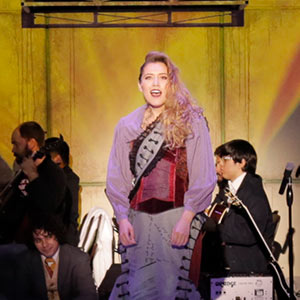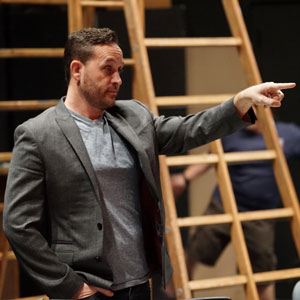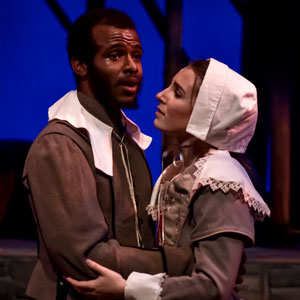‘Metamorphoses’ in Fullerton needs a heavier classical dose
— - Eric Marchese - Monday, December 1st, 2003
Most contemporary adaptations of older theater works go out of their way to retain the flavor and tone of the original.
When Mary Zimmerman chose to adapt David R. Slavitt’s translation of “The Metamorphoses of Ovid,” she decided to slant things toward contemporary teen audiences. Thus, Midas becomes a billionaire Wall Street venture capitalist, Phaeton, the son of Apollo, a spoiled Angeleno, and so forth.
The results, 2001’s “Metamorphoses,” captured several Tony Award nominations (and one win) in 2002, as well as several Drama Desk and Outer Critics Circle Awards and “Distinguished Production of a New Play” by the Drama League.
Stages Theatre Company’s staging, directed by Gary Krinke, definitely underscores this script’s contemporary teen slant – perhaps even too much. His cast is peppered with unseasoned young actors apparently lacking in classical training, and the humor in Zimmerman’s script is overemphasized.
While these factors are likely to make this staging highly appealing to younger audiences, veteran theatergoers may have little patience for what comes off as a college production. All that is a shame, for this staging’s technical and visual aspects are indeed impressive.
Set designer Jon Gaw and a team of builders have constructed a 6,000-gallon pool onstage, complete with wooden decking. The pool, integral to any staging of “Metamorphoses,” is used for wading, thrashing, splashing, swimming and, in one notable scene, a remarkable sea battle.
The pool is meant as a portal to the heavens between mortal men and the many gods in their pantheon – Zeus, Bacchus, Aphrodite, Hermes, etc. Gaw uses a chandelier and dozens of twisted ribbons to represent the heavenly bodies. He lights his set with care and precision, such as using deep red hues to intense effect or flickering strobes to approximate lightning during a storm.
The show’s costumes, designed by Krinke and Rayanne Trumbo, are patterned after the look of ancient Greece. The net effect, visually, is that of a large-scale classical staging – impressive for a space as small as that of Stages.
At least a few of Krinke’s younger performers have the acting chops needed to make their scenes work. Kym Canon delivers the goods in her portrayal of Alcyone, who begs her husband Ceyx from making an ill-fated sea voyage, and Euridyce, followed into Haydes by husband Orpheus immediately after their wedding.
Canon’s earnest style is impassioned, adding touches of the classical to her portrayals. On a lighter note, she’s among several performers who portray Phaeton, the offspring of the sun-god, Apollo, lending a comically contemporary, Valley-Girl spin to her reading.
Amanda Fink’s portrayal of Myrrah is among the evening’s most powerful and, owing to the subject matter, even more visceral than Canon’s fine work.
Myrrah, we’re told, is so taken by her father’s strength, virtue and good looks that she eschews romance. No other man, she reasons, can possibly measure up. Given the chance to make love to her dad, she goes for it – insisting that he be blindfolded, so he won’t know who his partner is.
Krinke uses soft, plaintive music to generate suspense and dread as Myrrah meets with Cinyras (Tom Patrick) for the first time, and though sensual, underscored with a jangling score, their sex scenes are tasteful.
Fink’s portrayal never hints that Myrrah’s fate is going to be anything other than colossally sad. What’s more, her mature acting skills measure up to the story’s powerful needs and those of veteran actor Patrick as the father aroused by his new young love and tragically ignorant of her identity.
Among the evening’s few other young talents worth noting are Laura Elizabeth Delhauer, whose Aphrodite is mature, majestic and understated, and Aleesha McNeff and Sean Rowry, who portray numerous characters throughout the evening.
The adult members of Krinke’s cast redeem themselves on more than one occasion – notably, Rose London and the aforementioned Patrick and Rose London. London essays five roles in the octet of stories as well as the shimmering prologue. Patrick’s acting skills not only tower in his work as Cinyras, but as another doomed dad – Midas, inadvertently turning his beloved daughter to solid gold, then consigned to finding a solution to the “curse” of his magic touch – and as the voracious Erysichthon.
If one can accept the evening’s more lighthearted touches as Zimmerman’s attempt at helping young audiences connect with the classics, one might find one’s own heart transformed by the eternal wisdom of the ancient Greeks.
Freelance writer Eric Marchese has covered entertainment for the Register since 1984.








